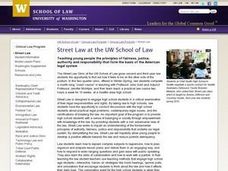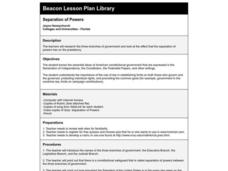Curated OER
Why Do We Separate Power?
Students investigate the separation of powers that are outlined in the Constitution. The lesson includes essential questions that are used to guide the research. The information is used to increase knowledge of how power is used in...
Curated OER
U.S. Constitution - Checks and Balances
Learners examine the separation of powers of the branches of the U.S. federal government. In this U.S. Constitution lesson, students listen to a SMART Board supported lecture on checks and balances of the Judicial, Legislative, and...
Curated OER
Essentials of the US Constitution
Students determine how the content of the U.S. Government enables the U.S. Government to function. They examine the roles and functions of the three branches of government and how the separation of powers and checks and balances affect...
Curated OER
Constitutional Acts (Chapter 3)
Help your students review constitutional acts in this review worksheet, which could also be used as a class quiz. Five matching questions and five multiple choice questions address checks and balances, the powers of the Senate and House,...
Curated OER
Constitutional Issues: The Separation of Powers
Students research and stage a debate on the question: RESOLVED that the Constitution should be amended to provide for a parliamentary system of government. They debate if a parliamentary system of government might be better.
National Endowment for the Humanities
Lesson 4 James Madison: Internal Improvements Balancing Act—Federal/State and Executive/Legislative
Who has the power? The founding fathers asked the same question when the United States was formed. Learners explore issues that arose during Madison’s presidency that raised constitutional questions. Through discovery, discussion, and...
Curated OER
Introduction to the Constitution: The First Three Articles of the Constitution, Separation of Powers
Students review the first three articles of the United States Constitution. In groups, they examine the three branches of government and their function. They follow the path of a bill until it becomes law and discuss Congress' role.
Facing History and Ourselves
The Nazis in Power: Propaganda and Conformity
The Nazis used the power of propaganda to encourage confirmative views and the discrimination of Jews. A social studies resource illustrates these issues through discussion, image analysis, and a writing exercise.
Curated OER
Constitutional Issues: Separation of Powers
Students discribe the principle and the history of separation of powers.
iCivics
Separation of Powers
In a fun and informative simulation, your learners will act in groups as lead chefs, menu writers, and nutrition inspectors in deciding a new school lunch menu. They will then compare and contrast their experience to the interaction...
Carolina K-12
Principles of the US Constitution
After breaking into groups according to major principles of government (i.e., popular sovereignty, separation of powers, checks and balances, etc.) in the United States, your class members will produce public service announcements...
Curated OER
Branches of Government
After reading a short text on the branches of government in the United States, future voters answer 8 fill-in-the-blank questions, as well as 11 true or false questions. This learning exercise would be a great homework assignment or...
Judicial Learning Center
The Power of Judicial Review
Marbury v. Madison is arguably the most important landmark case in the history of the Supreme Court. A fact-filled lesson provides background information about the case and two others related to the concept of judicial review. Scholars...
Curated OER
The Role of the Judiciary in a System of Separation of Powers and Checks and Balances
Students determine the difference between the different branches of government and assess the role of each within the American governmental system.
Curated OER
Branches of U.S. Government
In this branches of U.S. government worksheet, students answer 3 questions for each branch concerning separation of powers, then give examples from the textbook for the use of checks and balances for each branch.
Curated OER
Checks and Balances
Students take a closer look at the responsibilities of the Legislative, Judicial, and Executive branches. In this U.S. government lesson, students read articles 1, 2, and 3 of the Constitution and then use Venn diagrams to compare and...
Curated OER
Multiplying By Powers of Ten (E)
In this powers of ten activity, students multiply whole numbers by powers of ten. This four-page activity contains approximately 40 problems. Answers are listed on a separate page.
Judicial Branch of California
Separate But Equal - Is It Black or White?
The story of Ruby Bridges and the case of Brown vs. The Board of Education are fantastic tools for discussing the concept of separate but equal. Kids tackle some big questions about what is fair, what is civil, and what rights or laws...
Curated OER
Separation of Powers: Checks and Balances
Students discuss the reasons for separation of powers between the branches of government. They list the branches and identify the powers and functions of each.
Curated OER
Separation of Powers
Eighth graders explore and explain the responsibilities and limits of our national system of government. After reading various selections documenting the viewpoints of the federalists and anti-federalists and the separation of power,...
Curated OER
Separation of Powers
Eighth graders research the three branches of government and examine the effect that the separation of powers has on the presidency. They explain the importance of the rule of law in establishing limits on both those who govern and the...
Curated OER
Separation of Powers Between the Three Branches of
Students investigate the concept of the three branches of government by dividing into three teams. They record the powers of the three branches.
Curated OER
Claim Your Power
Fourth graders analyze the branches of the Texas government and identify its powers and characteristics. The separation of powers and checks and balances are identified.
Judicial Branch of California
Planet Fourth Grade is Researching the U.S. Constitution
Using the Constitutional Convention as a model, learners create their own governments. Other activities to explore the American Constitution include creating posters to help explain the Bill of Rights.

























